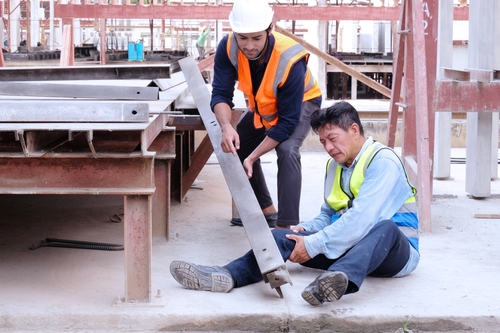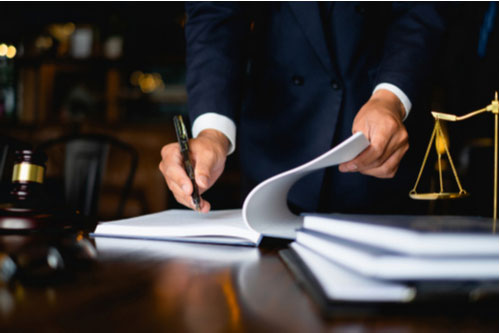Founder of Wade Law and expert trial attorney with experience in the courts and in the classroom, lecturing in several courses. Admitted to all of Georgia’s courts and the United States Supreme Court
Initial Steps After an Accident
After an accident, taking immediate action is crucial for your health and your potential personal injury claim. Here are the key steps to follow:
Seeking Immediate Medical Attention
Your health should be your top priority. Seek medical attention right away, even if you feel fine. Some injuries may not show symptoms immediately. A medical professional can assess your condition and document any injuries. This documentation is vital for your personal injury claim.
Documenting Injuries and Gathering Evidence
As soon as possible, document your injuries. Take photos of visible injuries and any damage to property. Keep records of all medical treatments, including bills and prescriptions. This evidence supports your claim and helps establish the extent of your injuries.
Importance of Accident Reports and Witness Statements
Obtain a copy of the accident report from law enforcement. This report provides an official account of the incident, which can be helpful in your case. Additionally, gather witness statements. Eyewitness accounts can strengthen your claim by providing unbiased perspectives on the accident. Collect contact information from witnesses for follow-up if needed.
By following these steps, you lay a solid foundation for your personal injury claim in Georgia. Taking prompt and organized action can significantly impact the outcome of your case.
Understanding Georgia’s Statute of Limitations
In Georgia, the statute of limitations for filing a personal injury claim is typically two years from the date of the accident. This means that you have a limited time to take legal action after being injured. If you fail to file your claim within this timeframe, you may lose the right to seek compensation for your injuries.
Legal Timeframe for Filing a Personal Injury Claim
The two-year period begins on the date of the accident or injury. For example, if you were injured in a car accident on January 1, 2023, you would need to file your claim by January 1, 2025. It is essential to keep track of this deadline to ensure you do not miss your opportunity for recovery.
Consulting with a Personal Injury Attorney
Benefits of a Free Consultation
Consulting with a personal injury attorney offers significant advantages. Most attorneys provide a free initial consultation. During this meeting, you can discuss the details of your case without any financial commitment. This opportunity allows you to understand your legal rights and options. You can also gauge whether the personal injury lawyer is a good fit for your needs.
How an Experienced Personal Injury Attorney Can Strengthen Your Case
An experienced personal injury attorney can enhance your case in several ways. They understand Georgia’s laws and procedures, which can be complex. They will guide you through the personal injury claims process step by step.
- Investigation: An attorney will conduct a thorough investigation of your accident. They will gather evidence, including accident reports and witness statements. This evidence is crucial for building a strong case.
- Negotiation: Attorneys are skilled negotiators. They can communicate with insurance companies on your behalf. This can lead to a fair settlement without the need for a trial.
- Representation: If your case goes to trial, having an attorney is essential. They will represent you in court and present your case to a jury. Their expertise can significantly impact the outcome.
In summary, consulting with a personal injury attorney can provide clarity and support during a challenging time. Their knowledge and experience can help ensure you receive the compensation you deserve.
Filing an Insurance Claim
After an accident, filing a personal injury claim begins with notifying your own insurance company. This step is crucial, as it sets the foundation for your claim process. Here’s what you can expect during this phase.
Interaction with Your Own Insurance Company
When you report the accident, your insurance company will collect information about the incident. Be prepared to provide details such as:
- Date and time of the accident
- Location of the accident
- Description of the events leading to the accident
- Information about any other parties involved
Your insurance company may also ask for a copy of the police report and any medical records related to your injuries. It is important to be honest and thorough in your responses. This information helps the insurance adjuster assess your personal injury case accurately.
Dealing with Insurance Adjusters
Once you file your personal injury case, an insurance adjuster will be assigned to your case. The adjuster’s role is to investigate the personal injury case and determine the amount of compensation you may receive. Here are some tips for dealing with insurance adjusters:
- Stay Calm and Professional: Maintain a respectful tone during all communications. This can help facilitate a smoother process.
- Keep Records: Document all conversations, including dates, times, and the names of the adjusters you speak with. This information can be useful later.
- Do Not Accept the First Offer: Insurance companies often start with a low settlement offer. It is essential to review this offer carefully and consider whether it reflects the full extent of your damages.
Understanding the insurance claim process can help you navigate this complex situation effectively. By being proactive and informed, you can work towards securing the compensation you deserve for your injuries.
Types of Compensation Available
When you file a personal injury claim in Georgia, you may be entitled to various types of compensation. Understanding these categories can help you assess the value of your claim and ensure you pursue all available damages.
Economic Damages
Economic damages refer to the tangible financial losses you incur due to your injury. These damages are often easy to calculate and may include:
- Medical Bills: This includes all expenses related to your treatment, such as hospital visits, surgeries, medications, and rehabilitation.
- Lost Wages: If your injury prevents you from working, you can claim compensation for the income you lose during your recovery. This includes both past and future lost earnings.
- Property Damage: If your accident involved damage to your property, such as your vehicle, you could seek compensation for repairs or replacement.
Non-Economic Damages
Non-economic damages cover intangible losses that are more challenging to quantify. These may include:
- Pain and Suffering: This compensates you for the physical pain and emotional distress caused by your injury.
- Loss of Enjoyment: If your injury affects your ability to enjoy life or participate in activities you once loved, you may claim damages for this loss.
- Emotional Distress: This includes psychological impacts, such as anxiety, depression, or post-traumatic stress disorder (PTSD) resulting from the accident.
Impact of Medical Bills and Lost Wages on Compensation
The extent of your medical bills and lost wages significantly influences the total compensation you can receive. High medical costs and extended periods of lost income can lead to a more substantial claim. It is essential to keep detailed records of all medical expenses and pay stubs to support your case.
In summary, understanding the types of compensation available is crucial when filing a personal injury claim in Georgia. This knowledge helps ensure that you receive fair compensation for both your economic and non-economic losses.
Georgia’s Modified Comparative Negligence Law
In Georgia, the modified comparative negligence law plays a crucial role in personal injury claims. This law determines how fault is assigned in an incident and how it impacts the compensation you may receive.
How Comparative Fault Affects Claims
Under Georgia’s modified comparative negligence rule, if you are injured in an accident, your compensation may be reduced based on your percentage of fault. For example, if you were found to be 30% at fault for the accident, your total compensation would be reduced by that percentage. This means if your damages were assessed at $100,000, you would only receive $70,000.
Determining Liability and Compensation
To establish liability, the court will evaluate the actions of all parties involved in the incident. The key factors include:
- Evidence of Negligence: This includes police reports, witness statements, and any available video footage.
- Degree of Fault: Each party’s level of responsibility is assessed. If you are found to be 50% or more at fault, you may not be eligible for any compensation under Georgia law.
- Negotiation with Insurance Companies: Insurance adjusters will also consider comparative fault when negotiating settlements. They may use your percentage of fault to justify lower offers.
Understanding how Georgia’s modified comparative negligence law works is essential for anyone filing a personal injury claim. It helps you anticipate how fault may impact your case and aids in preparing for discussions with insurance companies or legal representatives.
Timeline Expectations for Personal Injury Claims
Filing a personal injury lawsuit in Georgia involves several stages, each with its own time requirements. Understanding the timeline can help you manage your expectations and prepare for the process ahead.
Typical Duration of the Personal Injury Claims Process
The duration of a personal injury lawsuit can vary widely. On average, the process may take anywhere from a few months to several years. Here’s a breakdown of the typical stages:
- Initial Consultation: This usually occurs within a week or two after contacting a personal injury attorney. During this meeting, the attorney will assess your case and explain the next steps.
- Investigation Phase: This phase can take several weeks to a few months. Your personal injury lawyer will gather evidence, collect medical records, and interview witnesses. The complexity of your case can extend this time.
- Filing the Claim: Once the investigation is complete, your attorney will file a personal injury lawsuit with the appropriate insurance company. This step can take a few days to complete, depending on how quickly you provide the necessary documentation.
- Negotiation Phase: After filing the personal injury lawsuit, negotiations with the insurance company begin. This phase can last from a few weeks to several months, depending on the willingness of the insurance company to settle and the complexity of your case.
- Trial (if necessary): If a settlement cannot be reached, your case may go to trial. Personal Injury trials can take several months to prepare for and may last anywhere from a few days to several weeks, depending on the court’s schedule and the complexity of the case.
Factors Influencing the Timeline
Several factors can impact the duration of your personal injury lawsuit:
- Severity of Injuries: More severe injuries often require longer recovery times and more extensive medical documentation, which can extend the timeline.
- Complexity of the Case: Cases involving multiple parties, significant damages, or disputed liability may take longer to resolve due to the need for thorough investigation and negotiation.
- Insurance Company Response: The speed at which the insurance company responds to claims can vary. Some companies may take longer to process claims or may delay negotiations.
- Court Scheduling: If your case goes to trial, court schedules can affect how quickly your trial date is set. Delays may occur due to crowded court calendars.
Understanding these timeline expectations can help you stay informed and prepared throughout the personal injury claims process. Consulting with an experienced personal injury attorney can provide you with a clearer picture of what to expect based on your specific circumstances.
Call Wade Law For Help
Filing a personal injury lawsuit can be a complex process. At Wade Law, we understand the challenges you face after an accident. Our goal is to simplify this process for you. We offer clear guidance every step of the way.











